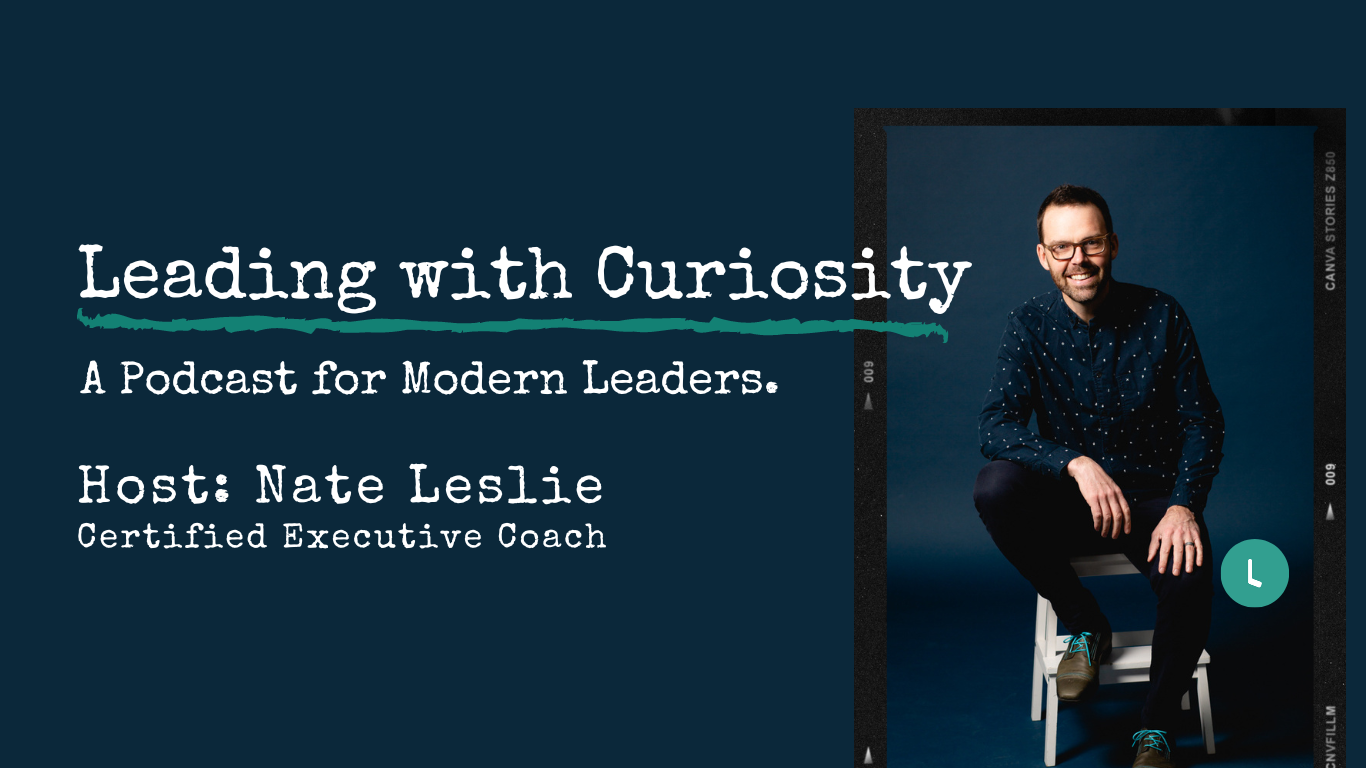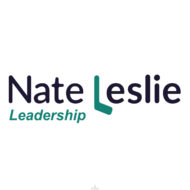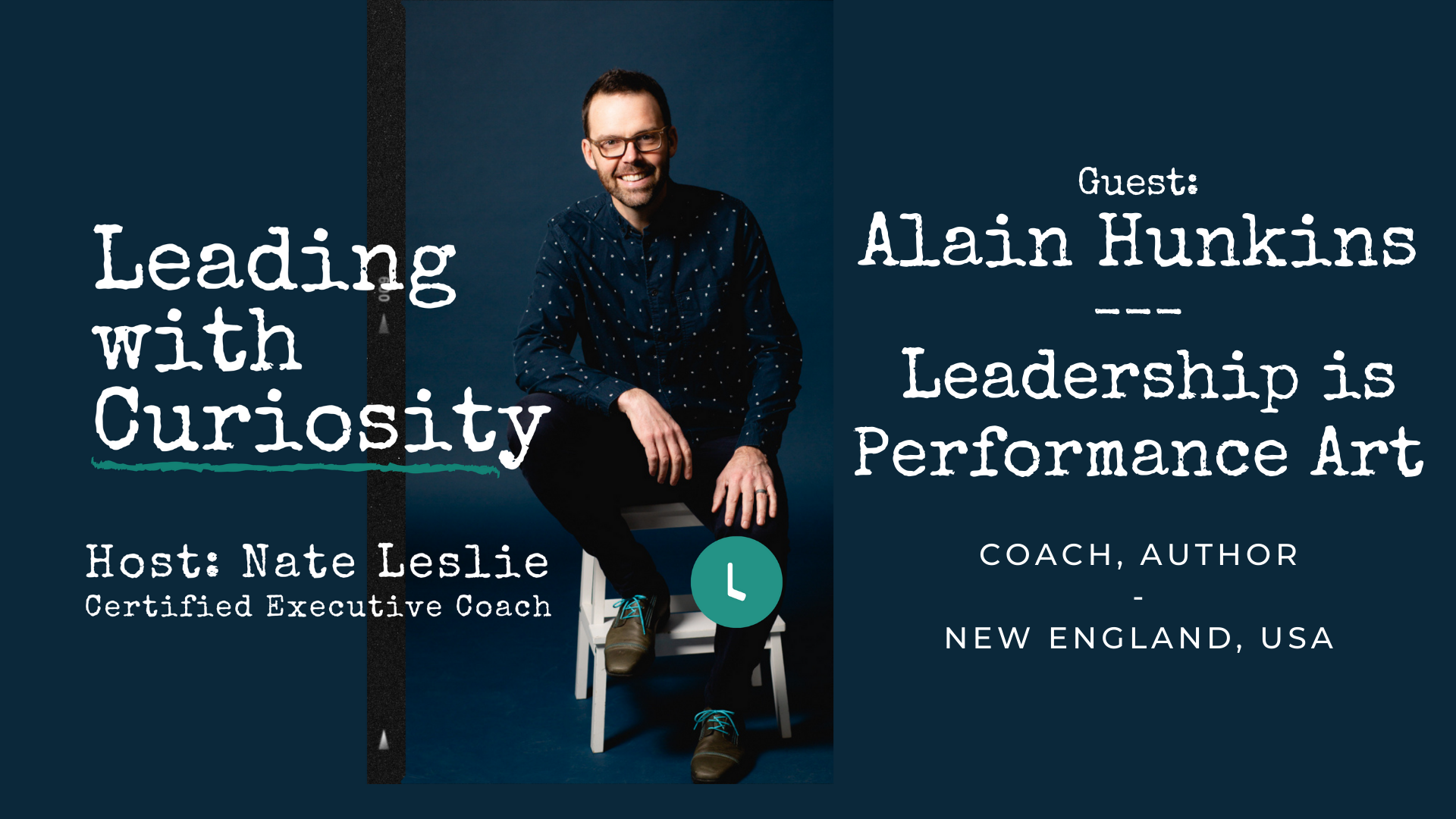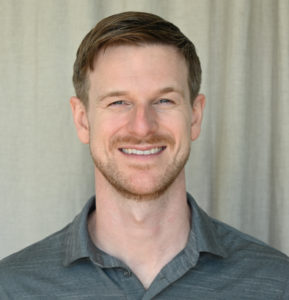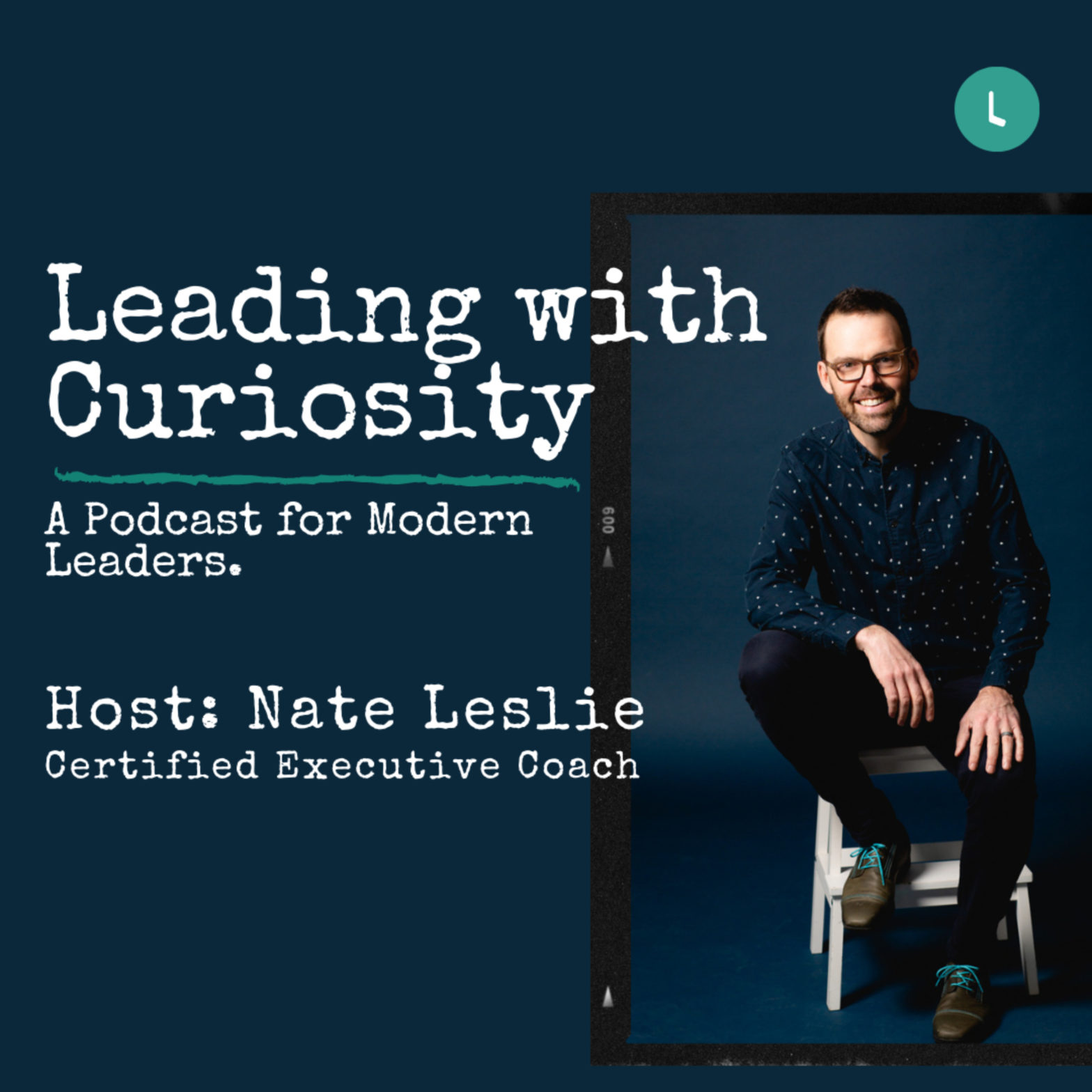Nate Leslie 00:24
Leadership is a performance art. The people we lead haven’t arrived until their voice is in the room, we need the people that we lead to be the protagonist in the story. These are just a couple of the mind expanding, brain exploding, easy to grasp, not commonly implemented ideas that today’s guest Alain Hunkins shares with our listeners. Alain has worked with companies like Walmart, Pfizer, Citi Group, GE, State Farm Insurance, IBM, Microsoft. He grew up in New York City, so we had some good laughs about that in our pre-interview and my time in New York, a humble and articulate and passionate leadership development facilitator and coach. By facilitator, he means the root word Latin “facile” like in French “easy” in leadership, helping people make things easier, easier to understand, easier to accomplish, those are some of our obligations as leaders. You’ve heard this before from me, I know I’m going to have him on again, I need to because we were just scratching the surface. And a thank you to two previous guests Todd Churches from NYU, and Rob Salafia from MIT. Two people who have led me in this path to connect with Alain today. Enjoy, Alain, welcome to Leading with Curiosity.
Alain Hunkins 02:18
Thanks so much, Nate. I’m so glad to be here with you today.
Nate Leslie 02:21
We were in our pre-interview, and I said hang on a second, we got to just start recording right now because you started to describe your journey from performing arts and how that has influenced what you’re doing now. Could you please explain to our listeners that journey that you embarked on from performing arts days?
Alain Hunkins 02:44
Obviously, we always catch these great moments in pre-interview. Hopefully I’ll do it justice. So, I grew up, my father’s family are all professional musicians and I say professionally orchestral level. You know, Berlin Philharmonic, Cleveland Orchestra, Dallas symphony, we’re talking top level and top-level people. I started playing the violin when I was five years old, and I ended up going to the High School of Music and Art in New York City and somewhere along the way I committed because I had a family. I didn’t want to practice eight hours a day. I don’t want to be a professional musician and I knew that by the time I got to college, however, when I got to college, I auditioned for a play. I ended up going on to graduate school, got an MFA from a professional theater acting, training conservatory, three years, very intensive. As I went through that, I was this idealist and I had mentioned that when I was an undergrad, I was a psych minor for a lot of years. My interest in theater and psychology are really connected because I think that for all of us whether you identify as a leader, which by the way, I think we’re all leaders because we must influence ourselves, if no one else, every day. Leadership is a performing art; everything boils down to something that we either say or do and behavior is the fruit of all the thinking and the mindset behind that. If you think about going back to acting, we all play roles every day, for example, how I show up with my two teenage kids, I play the role of dad, whereas with my wife, I play the role of husband, with my mom, I play the role of son, and I may not do it consciously, but the way in which I listened to different people the way I respond to different people, the way I will act around them. I think what great leaders start to do in any endeavor, is they start to be aware of their role more intentionally. I think loud leaders lead by default, and great leaders lead by design. So, what can I do to be the best dad in the world? How do I show up? What are the things that I think the best dad does? What do I think the best husband does? That’s my role, whatever it might be, and starting to realize, who can I learn from? Success leaves clues. Where are the clues? What can I learn, and how can I apply these lessons and integrate them and have them become habits of who I am and how I show up? Ultimately, if you think about going back to performing arts when you pay money to go to see a ballet, musical or a rock concert, what are you really paying for? You are paying to be transported on a journey that is completely engaging from the moment the lights go down and the curtain opens until you’re out in the parking lot, you just want to be completely engaged in that. In some ways we live in this age of entertainment with the cell phone in your pocket. You can engage with content constantly that knows how to suck you in and keep you involved. I think there’s a lot that we can all learn from the Performing Arts in terms of how we can become better leaders.
Nate Leslie 06:47
This idea of leadership as a performance art, I think we have already found the title of the episode perhaps. I have a hunch that you connect well to different people in the audience because in the pre interview you asked me a baseball analogy. You’ve mentioned ballet, Shakespeare, rock concerts. This idea of us as leaders being able to connect, not with people like us but being able to connect with the people we lead in a way that’s meaningful for them. I can already see that coming through in your description of that. What comes up for you when I kind of shine a light on that?
Alain Hunkins 07:39
What it shows me, is that one of the greatest personality traits is openness to experience and how important that is. I think for anyone who wants to be able to connect, whether you think of yourself in high tech or work in pharmaceuticals, I work in manufacturing. At the end of the day we all work with human beings. Being open to other people’s experience of what’s important to you, what is lifelike? A lot of them are doing different stuff than you and I are doing and like you talk to me about, what’s it like getting up at five in the morning to be on an ice rink because I know that’s what everyone seems to have to do to be able to get on the ice rink and that whole world of the discipline of being a professional athlete, I don’t really know what that’s like, but I’d love to learn. In 2021 and beyond, one of the most valuable skills that any of us can have is continuous learning. Will you continue to learn how to learn because everything else is going to become automated, outsourced, and obsolete quickly, there will be an algorithm or an act for it. So, what is the differential human factor? It’s learning how to learn, and I think great leaders get out of this idea of “I’m in charge”, I need to know everything, this is not the world that we live in anymore. It’s, I’m the leader, that means there’s a whole lot of information that’s living in different places and my role is to facilitate moving information from where it is to where it needs to be. We can take that information, turn it into insight, and apply it as wisdom to create results, which is a very different mindset than leaders had 20 years ago. This is what comes up for me as you talked about this idea of being open to experience.
Nate Leslie 09:47
Our tagline, command and control leadership, leading with curiosity. Your facilitative mindset when you and I connected, this idea of a chief facilitative or a facilitative officer, goes to the idea that we are not in charge, just expand on where you’re at.
Alain Hunkins 10:17
For years, I called myself a facilitator. I started off facilitating training programs and if you look at the etymology, the origins of where the word facilitate comes from the root of it is “facile” from a Latin root, it’s a Latin means easy, so we’re facilitators make things easier. And I think we know we live in a world with increasing levels of complexity, right? Everyone’s heard the acronym VUCA; volatile, uncertain, complex, ambiguous, so we live in this very complex world. What we want is for leaders, anyone who can help influence things to make things a little easier for us. So, what can you do to make it maybe reduce some of my stress or maybe save me some time? Leaders can help facilitate, make things easier for people because we have all these technological tools at our disposal. However, if we don’t use the tools in the right way, we end up becoming enslaved to the tools. I talk to so many people who feel like they spend their days as human email processing machines, sitting in meeting after meeting after meeting, those are the two big time sucks in most organizations. Technology is a great servant, but it’s a lousy master. We must embrace as the facilitators and chief recognizes that you’re leading humans and what you can do for humans to be able to perform at their best. There are three meta skills that great facilitative leaders have, which is the skill of connection. So, what are you doing to build real genuine higher trust relationships with other people? Then there’s communication, what are you doing to make sure that we are walking away with shared understanding? And then there’s collaboration so what are you doing to design an environment where others can show up fully as themselves and do their best work for the long term in a human sustainable kind of way? So again, to recap, that’s connection, communication, collaboration. Those are the foundational skills of a facilitative leader.
Nate Leslie 10:23
And the building blocks of the leadership. Correct and the leadership code of your latest book.
Alain Hunkins 10:55
These three Cs came out of me working 25 years, 22 years in the field at the time, where I’ve worked with 10 to 15 different teams a month. I was a road warrior traveling, doing leadership training, management training and in 2011, I always wanted to write, and I had a friend, he’s a writing coach. He said, Alain, my words of wisdom for you “writers write”. He said, why don’t you start with a blog, can you commit to writing 300 words a week? Yeah, I think I can do that. So, I started writing a blog once a week and so I did not miss a week for five years. Five years later, I’ve got over 250 blog posts, and I started reviewing, going through all of them, some of the early ones were rubbish. I take the story, what’s the principle and turn that into a quick little blog post? I’ve reviewed all these 500 blog posts and I went, what are the major overarching themes and what I found was they got bucketed into three categories: connection, communication, and collaboration. These three meta skills weren’t something I sat down and thought of, they emerged from the literature of the biggest themes that I kept seeing time and time again.
Nate Leslie 10:55
I’m reminded of the work I’m certified to do with the supporting lines Institute where we measure high performance culture, and the assessment is very related to psychological safety and workplace engagement and high performance. Are we achieving more goals than we otherwise would have? Am I having a positive human experience at work while I do it? The buckets that the measurement tool divides the data up into is helping teams align, collaborate, and grow as people and in their profession. Those themes are just coming up in the descriptions of your connection, communication, and collaboration for me and as it did in your TEDx talk, I felt it when I was watching it, doing research for this interview this idea of facile, of simplifying large concepts for humans to enhance the capabilities of those they work with, on a day-to-day basis is at the crux of it. No longer is its subject matter expert, right when Bill Gates said, “I could no longer program for Microsoft”, who I believe has been a client of yours. 100 years ago, a shoemaker was good at making shoes so he or she became the manager of the shoe factory and then one day the CEO and knew what everyone on the shoemaking floor needed to do. Those days are gone in this environment. of technology and flow of information. If the leader is no longer the gatekeeper of the information, and mothers and fathers are no longer the gatekeepers of information for their own children, it’s helping people navigate that information in a way that’s meaningful, and inspiring, and efficient and effective.
Alain Hunkins 16:03
It’s a totally different mindset than I know, it’s certainly the way I was raised. Because how many of us do this, oh I don’t know what the answer to that is, Google it, look it up on YouTube. The fact that we have access to subject matter expertise everywhere today, and that can help you do so many things and, in some ways, that has removed the barriers of entry. For example, if you want to start your own business today. I mean, what kind of capital operating costs you get depends on what it is. With the internet and a laptop, you’re good to go and do a lot of stuff.
Nate Leslie 17:37
It removes the burden of the leader needing to have the answers because people can just google it. Simply speaking, it’s the burden that leaders carry thinking they need to have the answers for every challenge that their people face.
Alain Hunkins 18:00
As a certified coach, when you went through coach training, seeing beginner coaches’ kind of get stuck in that deer in the headlight’s paralysis moment because as the client is speaking up about something, this sense of I need to have the answers. What if I can just show up and be totally present, not knowing and not needing to know, but just listening and then reflecting with good questions and helping people to discover their own answers.
Nate Leslie 18:31
That’s what I love about this is letting go of needing to have the answers. We’re better fathers and husbands, hopefully because of it, as well. It’s really impacted things around our house. My wife has gone out, she runs her own business, but she’s gone out and done coach training too. It’s that weight those leaders carry. It’s the biggest liberation of ego and expectation on myself. Even in my previous world and ongoing world in sport development, I used to think I needed to have the answer as the subject matter expert at the front of the room rather than at the center of the ice. Forgetting, totally oblivious as a young coach hockey coach doing that that those volunteers that might have less hockey experience than me, I’ve learned years later that they lead hundreds of people in large organizations and had so much to give that I didn’t give them credit for because I was blind to the idea of simply asking what value do you bring? When I looked at your bio, and clients include Walmart, Pfizer, Citi Group, GE, State Farm, IBM, GM, Microsoft, those are some large organizations, can you can you give us a peek behind the curtain of Alain Hunkins going into one of those opportunities, knowing the vast amounts of internal training programs and experience that some of those leaders have but that the value of holding space for them to talk about their challenges, can still have?
Alain Hunkins 21:01
When I first got into this whole field, you know, and I was starting to do business consulting, I had very little business experience and just a little bit more consulting experience. I remember really feeling a little intimidated, I’m going to be consulting at the time for vice presidents, directors, a CEO, or whatever. I had a great mentor named Sue. Sue said, then don’t worry about being known at all, which kind of harkens back to our earlier conversation. In fact, all you really must focus on is being “learn at all”, you want to be the most curious person in the room. She worked with me to create a fairly boilerplate of starter questions that I could use in a conversation, you could call them coaching questions. Things like, what’s the biggest challenge your team faces? The key thing is after you ask the question, you need to really listen and that’s the part that a lot of people forget. You must listen and not try to upmanship because these leaders, they’re all smart, they know their business, but if you just ask them questions, they will unlock the keys to the castle for you. I started building relationships with them, because how many of us really listened to somebody else? I think it just comes down to just being present, you might be an executive vice president at Microsoft or GE or GM or something, but ultimately, you’re a human being. Combine it, this is like the coaching process, going through, clarifying, ultimately, its creative problem solving. Having this attitude of curiosity and a heart for service goes a long way as well. If you’re truly there to serve and you don’t really care about what people think about you or what you think about them and are curious, you will do well.
Nate Leslie 25:18
I have about three things and I’m going to try to zero in based on your last description. Number one is for the listeners who weren’t quite sure what coaching is, thank you for giving us that practical example, whether it’s a small team or an individual on that process. Thank you for that very easy to understand, facilitated description of the coaching process. Number two, in your TEDx talk, you talk about the number one thing that people think that determines success in the work environment in terms of profitability, and people staying, staying around, and having a positive human experience is their relationship with their direct supervisor. Our data through supporting lines also shows an effective one on one where you show up as a development conversation and not try to be just present but try to be present is the number one thing that can move the needle on so much about performance. Number three, I’d love to hear back from you. That coaching moment in a small group where you’re holding that exact space, starting with what’s the biggest challenge you as a team are facing. For people who are trying to lead better meetings, lead better team coaching, versus bullet point agenda update, go back to work. What one awakening did you have through your decades of experience where holding that space for more than one person makes it an effective session?
Alain Hunkins 27:23
People haven’t arrived until their voice is in the room. So often people show up to meetings as passive consumers of the meeting. It’s your meeting, you’re leading it. As opposed to if you’re leading a small group meeting, let’s say eight people, what am I doing? I’m leading the meeting. What am I doing to make sure that I hear from every single one of those people in that meeting and get their input on something somehow, and if I’m not, why are we having a meeting? How many of us have seen the meme? You know, I survived another meeting. There are a lot more expedient ways to do it than to meet. Let’s say you’re working with 50 people, it might not make a lot of practical sense for you to be able to go around and hear from 50 people, however, and you can do this on Zoom, you could do it at your zoom. Let’s go into breakout rooms and we’re going to get into rooms of four and we’re going to have 12 rooms of four and please pick a spokesperson and share your biggest takeaway from this question. Give a provocative question. Let them go for five minutes, come back, have a spokesperson, whatever it is. Now in those small rooms, they’ve gotten a chance to talk, they’ve shown up, they’ve seen, and they’ve been seen by other people. You don’t want people to be these passive spectators, you want them to be protagonists in the story. The more that you can create ownership, the more that you can have people create engagement and fun. I’d say start by looking at what I am as a leader doing to make sure that other people’s voices are being heard, and we haven’t even touched on how that plays into the whole issue of equity, inclusion, and diversity.
Nate Leslie 29:48
Perhaps because we’ve come full circle I’m scrambling through my notes again, people haven’t arrived until their voice is in the room. And it comes back to my very first observation of your baseball, rock, ballet, Shakespeare. What is it that we can do to facilitate that opportunity? Where do we need to go to bring that voice into the room? Just because it’s baseball for you? Doesn’t mean it’s baseball for that person. That human connection heard for me as I head into a bunch of teamwork in the next couple of weeks with some groups that’s really going to be top of mind. And I know there’s someone thinking my next meeting is going to be way better because I listened to this conversation between Alain and Nate and I’m just grateful to have the chance that you took the chance to meet with me.
Alain Hunkins: Thank you for having me on the podcast, Nate, this was a great conversation with lots to take away from it.
